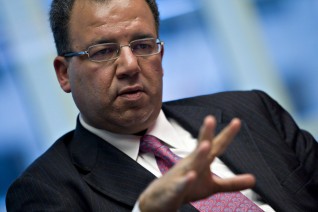NEW YORK (Reuters) — A formal call for Palestinian statehood at the United Nations this week could bring severe financial strains, even a potential collapse of the Palestinian Authority, the territories’ top banker told Reuters on Monday.
The United States, a major source of financing and aid for the Palestinian Authority, opposes a unilateral call for statehood.
Washington has warned of repercussions if President Mahmoud Abbas calls for statehood on Friday, when he is scheduled to address the UN General Assembly.
“It would have a major impact on the economic situation in the West Bank, if you lose $500 million [in US aid] from financial support for development in the West Bank,” Palestinian Monetary Authority Governor Jihad al-Wazir said of his concerns about possible US actions.
Some US politicians have said they will try to cut American aid to the Palestinians if they refuse to back down.
“Really, the risk of a PA collapse is very real under the financial strain, without US assistance, without donor assistance in general,” he said in an interview on the sidelines of the Blouin Creative Leadership Summit.
If the US were to withdraw aid to the PA, al-Wazir said it is unlikely to be made up by other donor countries.
“I think it will be highly, very difficult at this stage, because Arab support also hasn’t been forthcoming as much as it should have when it comes to budget support,” said al-Wazir, who oversees operations in both the West Bank, where the PA is based, and the Gaza Strip, which is controlled by the Islamist group Hamas.
If Abbas makes his case for full membership, the United States, a permanent member of the UN Security Council, said it will block the move on the grounds that only a resumption of a two-decade-old negotiation process with Israel can advance the cause of peace.
“The biggest fear now is that if the Palestinians are turned back empty-handed, what is going to happen to the situation in the West Bank and in particular in Gaza,” he said.
Outlook much worse
Last year the economy in the Palestinian territories grew 9 percent, precipitated by donor aid, al-Wazir said.
The outlook for 2011 is significantly worse. He reiterated his outlook for gross domestic product of 3.5 percent.
He cited such negative factors as the turnover of regimes throughout the Middle East during the so-called Arab Spring for creating uncertainty and instability in the region.
“Then the Arab Spring comes in and then the dynamic of the whole region changes,” he said.
“The surprise to us is that there was an Arab Spring in almost every capital, except in the West Bank and Gaza. The reason for that is they were waiting to see what is going to happen in September,” al-Wazir said, describing a “September effect.”
He also cited continued Israeli restrictions on the economy as another factor feeding into the downturn.
“The Palestinian business community has been holding its breath for the past few months,” al-Wazir said, describing the lack of clarity over what will come from this month’s UN meeting.
He said merger deals have been put on hold and businesses stopped development plans and hiring.
The decline in business activity dovetails with the failure of promised financial aid being delivered for late and reduced wages. The PA pays salaries to 150,000 people in the West Bank and the Gaza Strip and monthly allowances to another 75,000 people.
“Next month it will be a problem [for salaries], probably, unless we get some funding,” al-Wazir said.


